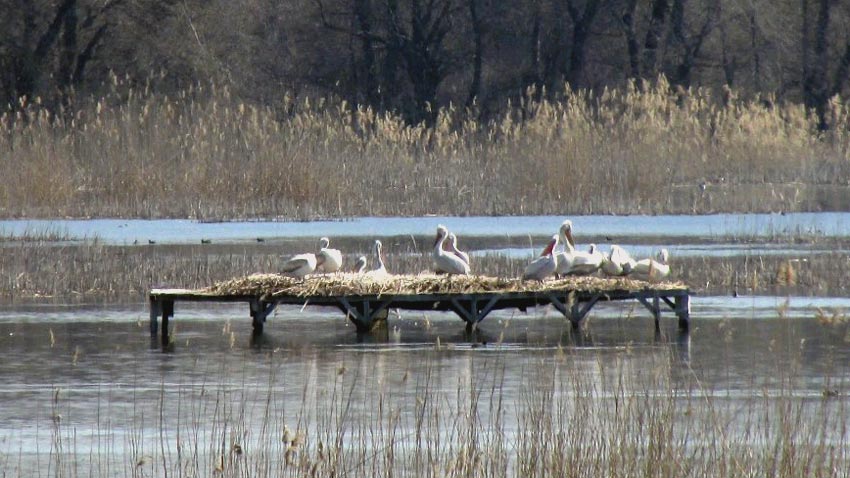The first pairs of Dalmatian pelicans which in March built their nests in the Srebarna Nature Reserve on the Danube River hatched a new generation. The pelicans were born in the wooden pile platforms specially built for them in the northern part of the wetland.
The protection of the Dalmatian Pelican colony is among the priority activities in Srebarna reserve. Under a project implemented by Regional Environment and Water Inspectorate, in the coming weeks it is planned to establish new places with suitable conditions for nesting more birds. This can be done by mowing the reeds and building new wooden platforms.

The biosphere reserve near the village of Srebarna is located 2 km south of the Danube River and is located right on the road of migratory birds from Europe to Africa - Via Pontica. Due to the rare and endangered species of birds, the wetland is included in the list of UNESCO World Natural and Cultural Heritage Sites.
221 species of birds nest in Srebarna. The reserve maintains 22 rare, vulnerable or endangered species of animals and plants according to the European Red List of Globally Endangered Animals and Plants, as well as 149 species of flora and fauna, which are included in the so-called Red Book of Bulgaria of endangered species. But the most valuable natural object in the reserve is the numerous colony of Dalmatian pelicans. Such colonies in the Old Continent exist only on the Balkan Peninsula.
An eco-trail with observation decks and gazebos for recreation has been built around the biosphere reserve, as well as a natural history museum, which presents the rich flora and fauna of Srebarna.
Compiled by Veneta Nikolova
English version Rositsa Petkova
Photos: bulgariatravel.org and archive
On the night of Saturday to Sunday (30 March), at 3am, we need to move the clock forward one hour - to 4am. This will give us an hour less sleep on that particular night, but in the long run we will be able to make better use of daylight, which should..
Bulgaria has joined a multinational nomination for accession to the element "Pasture traditions", inscribed on the UNESCO List of Intangible Cultural Heritage. The event was marked on March 28 with the official signing of the nomination by the..
The international business exhibition Architectural Building Week 2025 starts today at the Inter Expo Centre in Sofia and runs until 29 March. It is being held alongside the Green Energy and Building Information Modelling (BIM) forums. This year's..
President Rumen Radev was a guest at the Elhovo holiday and the celebration of 100 years since its declaration as a town, BTA reported. According to..
Guided by the idea of preserving the Bulgarian spirit, culture and language, with 35 years of experience as a Bulgarian teacher and having worked in..

+359 2 9336 661
